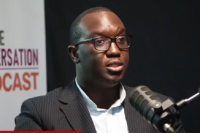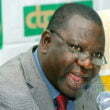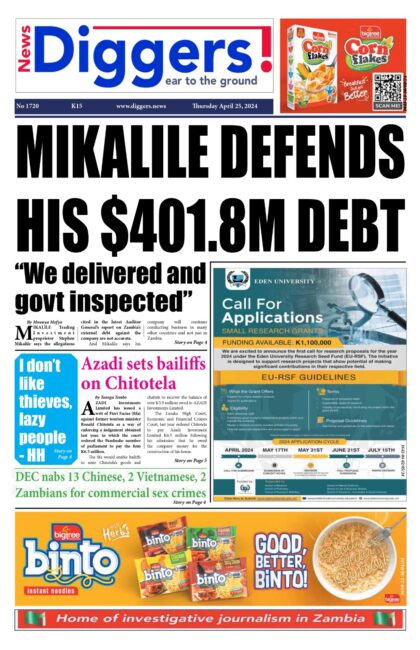GOVERNMENT must consider restructuring Zambia’s huge debt stock and reduce its appetite for excessive borrowing because commercial lenders do not usually cancel debt, says economist Professor Oliver Saasa.
Commenting on President Edgar Lungu’s request to Chinese President Xi Jinping for debt relief and cancellation, Prof Saasa observed that while the development was welcome, the only challenge with Zambia’s debt stock was that a bigger chunk of it emanated from commercial lenders as opposed to concessional debt.
He, therefore, advised government to minimize its appetite to contract sovereign debt and curtailing it to levels where it could easily be serviced, or risk sinking back into the same debt problem.
“We are in a situation where even though with cancellation that has been requested, we, actually to a significant degree, have to consider for much of our debt, it has to be restructured because commercial lenders will not usually cancel debt. Opportunities for cancellation are usually at a bilateral-level like country-to-country. But in China itself, you find that we are contracting from companies and these financial institutions, the Government of China may own even 100 per cent, but they are commercial financial institutions who we are borrowing from,” Prof Saasa said in an interview.
“So, yes, the Government in China can have an overbearing influence on a decision on whether or not one of their parastatals can cancel or suspend. It’s not something with this background that we should be surprised. In fact, what the international community is doing now, including the IMF (International Monetary Fund), is to appeal to bilateral (countries) that are members of these multilateral institutions to consider cancellation where it’s possible, but the focus is more on suspension of debt servicing.”
He insisted that Zambia’s debt stock, which largely comprised of commercial debt, was not likely to be cancelled.
“As you are aware, COVID-19 has had adverse effects on countries that are not only poor in terms of economic prospects, but also in terms of the extent to which they are indebted by way of debt contraction. And many of these countries have had serious challenges. For the Zambian case, you are aware that before COVID-19 set in, and the adverse effect failed, we already were in a very serious fiscal challenge. We had severe challenges that include debt from China, but a significant portion of it is commercial debt as opposed to concessional debt. We are talking about debt, which we contracted for the capital market, debt which is the Eurobond,” he added.
But Prof Saasa hoped that a significant portion of the debt would be cancelled if the Chinese government responded positively to President Lungu’s request.
“For Zambia, China is a major lender to Zambia in the last four to five years. At a bilateral-level, China accounts for more than 50 per cent of what we owe. So, if China responds positively to this appeal, a significant portion will come out, there is no question about it, but whether this is really what we have to look up to is subject to debate. The big challenge in Zambia is less. The magnitude of the debt now is a problem. Our preparedness to manage debt in a manner that is sustainable or to contract debt in a manner that is sustainable because if the debt is cancelled but you do not do something that addresses the reason why you contracted it in the first place, of course, it’s like cancer, it will germinate back,” he observed.
Prof Saasa said unless the Zambian government minimized its appetite to contract sovereign debt, curtailing it to levels where it could easily be serviced, the country would relapse.
“The solution, now, is government to demonstrate to China and to the world that we are ready and willing to take action and put things in place that will secure our ability to service debt when it falls due. This is what we call debt sustainability that allows us to contract debt in a manner that allows us to be able to pay it when it falls due. At the moment, that is why you have seen challenges that we had with the IMF. They are expecting to hear government, especially as we revise our 2020 budget, they are expecting government to come out very clearly in a manner, which they want to manage the debt. This does not subtract from what the President is appealing for from China, but it underscores a very important fundamental reality on the Zambian scene, now, that unless you ensure that you minimize your appetite to contract sovereign debt, curtailing it to levels where you know you will be able to service it when it falls due, we will get back to the debt situation again,” Prof Saasa advised.
He also asked government to go beyond just asking for cancellation by avoiding reverting to the same problematic debt accumulation.
“Cancellation is only temporary; if you do not address the situation, you will go back to it. It’s like you contract a disease, then you find a doctor who will treat you for free, but then you do not actually take measures to stop you from contracting that disease. That is exactly where we are now. The challenge on the government side, now, is to make sure that we go beyond requesting governments for cancellation, but begin to ask questions that, ‘are we ready and willing, as a country, to make sure that we don’t relapse back to this problem? Because it’s affecting development, it’s affecting health, it’s affecting education and affecting literally what it takes for a government to look after its people,” said Prof Saasa.
According to official figures on Chinese loans cited by the China Africa Research Initiative (CARI) at Johns Hopkins University, Zambia had accumulated loans from China totalling almost US $6.4 billion at end-2017.
This means that Zambia’s debt owed to China was estimated at over 70 per cent of the country’s total debt stock, which was US $8.74 billion at the end of 2017.
And the US-based Brookings Institution estimated that in September, last year, loans from China accounted for 65.8 per cent of Zambia’s external debt, an African record.












